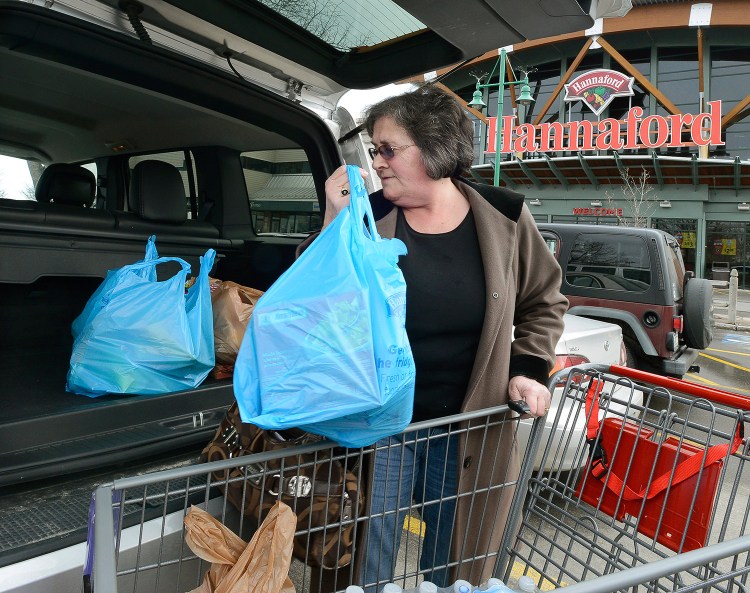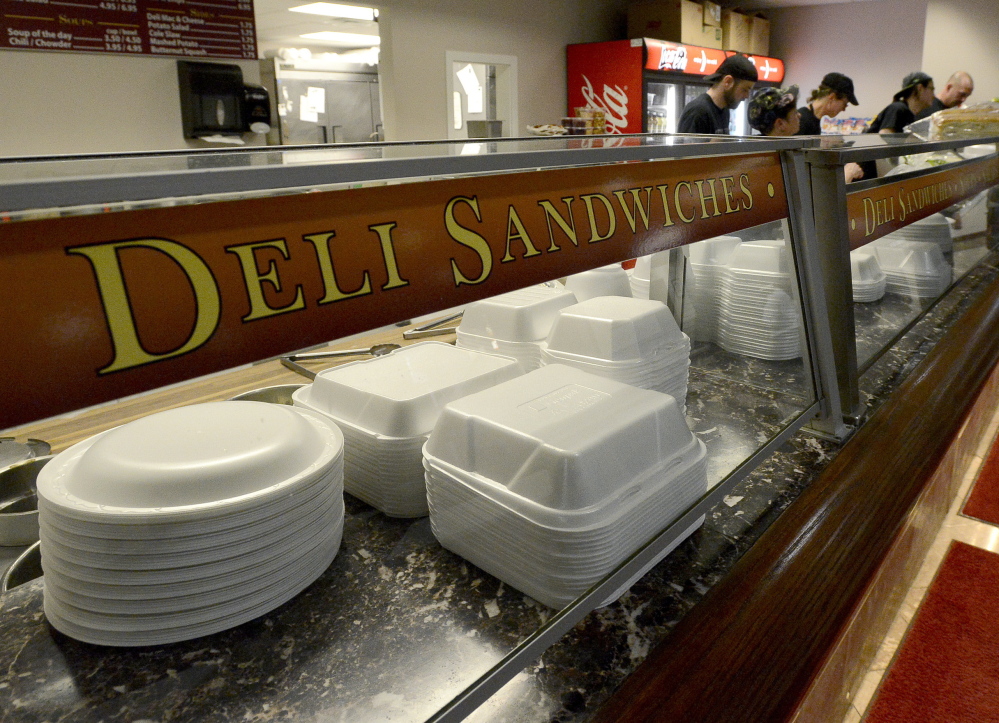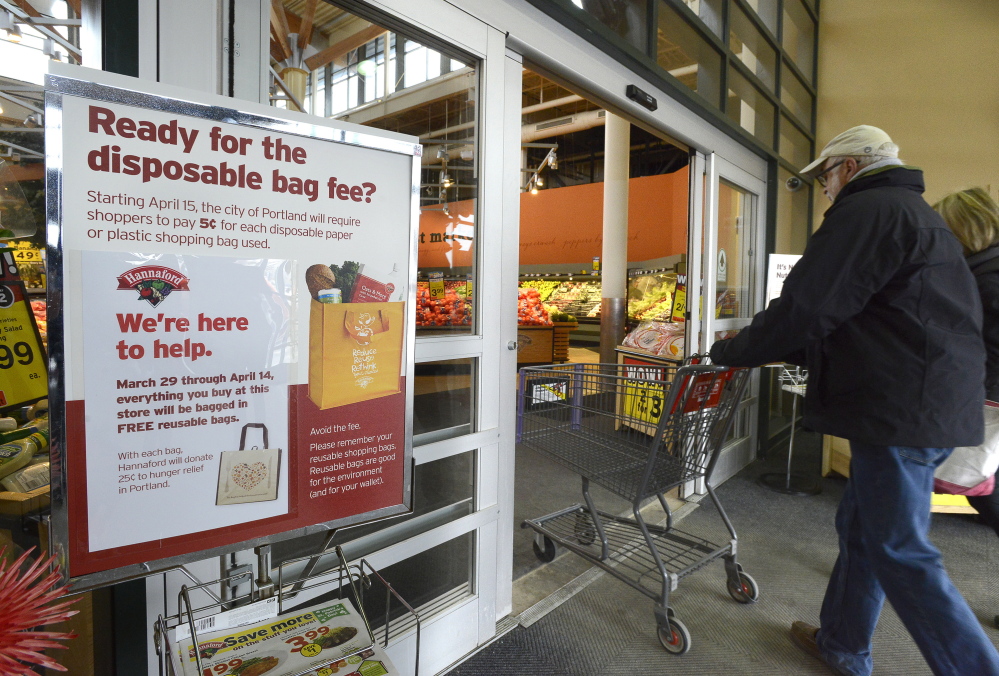Portland businesses are phasing out foam containers and gearing up to charge customers a nickel for disposable shopping bags in preparation for two new “green packaging” policies that take effect next month.
On April 15, Portland will become the first city in Maine, and one of just a handful in New England, to both impose a fee on disposable plastic or paper shopping bags and to ban many businesses from using polystyrene food and beverage containers.
In response, one major Portland retailer, Hannaford Supermarkets, announced Tuesday that it will launch its own consumer education campaign. Between March 29 and April 14, Hannaford will bag all groceries at the chain’s two Portland stores in reusable bags that will be given to customers for free.
The 5-cent fee will apply to disposable plastic or paper bags given out at stores where food – including milk, bread, soda and snacks – constitutes at least 2 percent of gross sales. In a compromise aimed at softening opposition within the business community, retailers will be able to keep those nickels.
The Portland City Council passed both initiatives last June in hopes of reducing the amount of non-biodegradable trash that ends up on city streets, in storm drains and eventually in Casco Bay. Numerous businesses opposed the measures last year, and remain skeptical nine months later.
“It starts April 15th and we’ll see what happens then,” said Bob Hannigan, owner of Hannigan’s Island Market on Peaks Island, who regards the two policies as another financial burden for businesses and customers. “But it is what it is. It’s Portland.”
Others, however, are excited about Portland’s new green policies.
Sarah Lakeman, a Portland resident who works as the Natural Resources Council of Maine’s sustainable Maine projects director, said bag fees are now being discussed in York, Falmouth, Brunswick, Topsham and Freeport. In fact, York selectmen will hold a public hearing Monday on a proposed bag fee modeled after Portland’s policy.
“I think a lot of towns in Maine look to Portland and then follow suit,” Lakeman said.
GIVEAWAY, DONATIONS AT HANNAFORD
Portland is the first community with Hannaford stores to adopt either a bag fee or a foam ban.
Spokesman Eric Blom said Hannaford expects to give out about 100,000 bags at its two Portland stores during its reusable bag campaign. He did not know the cost to Hannaford of either the plastic or the reusable bags.
During the two-week campaign, Hannaford also will donate 25 cents for each reusable bag, which retail for $1.19 each, plus all proceeds from the 5-cent bag fee to local hunger relief programs. After April 15, Blom said, all of the bag fees paid at the Portland stores will be donated to hunger relief.
To comply with the polystyrene packaging ban, Blom said the stores will use alternatives for meats packaged in-store and will no longer sell foam products, such as disposable plates and cups. Products that arrive at the store in foam packaging – such as raw meats – are not affected by the ban.
“There is an awful lot going on behind the scenes to make sure it is as easy as possible for customers,” Blom said. “We customize programs for all of our stores, so in that sense it is not unusual. The challenge with this is it’s the first we have done.”
PRAISE, DISCONTENT OVER BAG FEE
At the Hannaford store on Forest Avenue, customers said they didn’t care about the polystyrene ban, and their reactions to the bag fee were mixed.
“I think it’s great,” said Eileen Esposito. “I’ve been bringing my own for years.”
George Burnell, however, had a different take.
“I think it sucks,” he said. “I take the plastic bags and use them around the house.”
Burnell objects to paying for something that he’s always gotten for free. Asked what he’ll do come April 15, Burnell, who lives near the Forest Avenue Hannaford, said, “I’ll probably go to the Hannaford in Scarborough. I’m there a lot anyway.”
Joan Cushman has mixed feelings about the fee. She doesn’t carry reusable bags because, like Burnell, she uses plastic bags around the house. But she said the fee might prompt her to bring reusable bags.
Patrons of Walgreens on Marginal Way and CVS on Congress Street were mostly unaware Tuesday of the upcoming 5-cent fee, but they also were unfazed.
Susan Conover, who was picking up cosmetics at Walgreens, doesn’t live in Portland but said the fee doesn’t bother her.
“If it’s just one or two bags, I probably won’t even notice,” she said.
Conover does use reusable bags for her grocery shopping and trips to Wal-Mart or Target, she said, but doesn’t always remember to bring them for smaller purchases.
“I guess it’s a good incentive for people to reuse,” she said.
GROWING TREND IN NATION, WORLD
More than 130 communities across the country – including major cities such as Washington, D.C. – have adopted disposable bag fees ranging from 5 cents to 25 cents for each bag, or have banned plastic bags altogether. California’s legislature passed a statewide ban last year, although bag and plastics manufacturers are organizing a referendum campaign to overturn the ban at the ballot box in November 2016.
Far fewer communities have passed ordinances banning the type of polystyrene containers – often referred to by the trade name Styrofoam – used in coffee cups and take-out food orders. Freeport has banned foam containers since the early 1990s and Maine prohibits food service vendors from using polystyrene at state-owned facilities.
HELPING BUSINESSES WITH TRANSITION
Last week, Portland sent a letter to more than 500 businesses reminding them about the coming changes and offering assistance to owners as they make the transition.
“The City of Portland joins many jurisdictions around the globe that have chosen to adopt packaging ordinances in order to reduce waste generation, reduce litter in the environment and to promote the use of recyclable packaging whenever possible,” reads the letter from Troy Moon, manager of the city’s environmental programs and open space. “We look forward to working with you to achieve these goals that will enhance the appearance of the city and protect the health of the environment, including our waterways and Casco Bay.”
Send questions/comments to the editors.





